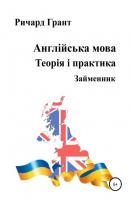Англійська мова. Теорія і практика. Займенник. Ричард Грант
Чтение книги онлайн.

Читать онлайн книгу Англійська мова. Теорія і практика. Займенник - Ричард Грант страница 4
Название: Англійська мова. Теорія і практика. Займенник
Автор: Ричард Грант
Издательство: ЛитРес: Самиздат
Жанр: Педагогика
isbn: 978-5-532-94828-0
isbn:
I feel terrible. – Я страшенно себе почуваю.
I’d like to have a Porsche but I cannot afford it. – Я хотів би мати Порше, але я не можу собі цього дозволити.
I dressed quickly, had my breakfast and left for work. – Я швидко одягнувся, поснідав і поїхав на роботу.
Вправа 18
Поставте необхідний зворотний займенник..
The water is hot, don’t burn …. – The water is hot, don’t burn yourself.
1. I am angry with …. 2. Can you do many things …? 3. You see you've cut … again. Be more careful. 4. He fell down and hurt …. 5. Does your friend Nick often talk to you about …? 6. I think that poor dog hurt …. 7. Tell me more about …. 8. Did your mother buy anything for … last week? 9. He came into the room and introduced …. 10. She believes in …. 11. Are you always sure of …? 12. We didn't know where to hide …. 13. We are sure of …. 14. Can a little child take care of …?
Вправа 19
Поставте необхідний зворотний займенник.
1. She is very sure of …. 2. They did everything …. 3. Do you believe in …? 4. Children, you can't do that …. 5. Did you translate the text …? 6. Did the pupils answer all the questions …? 7. They always speak only about …. 8. I saw everything …. 9. Did you make the dress …? 10. We should always believe in …. 11. The knife was sharp, and she cut …. 12. Babies cannot look after …. 13. They introduced …. 14. I tried to control ….
Вправа 20
Знайдіть помилки в деяких реченнях і виправте їх.
1. My sister taught himself to swim. 2. Anna repaired the chair herself. 3. The children are making themselves something to eat. 4. I hurt me when I fell down the stairs. 5. We're meeting ourselves at 8.00 this evening. 6. We're enjoying ourselves very much.
Вправа 21
Дайте відповідь на питання, маючи на увазі, що всю роботу люди зробили самостійно.
Who bought that book for him? – He bought it himself.
1. Who cooked your breakfast this morning? 2. Who helped them to translate the text? 3. Who helped the little girl to dress? 4. Who helped you to find the way? 5. Who cleaned your classroom? 6. Who washes your clothes? 7. Who broke his tape-recorder? 8. Who built their house? 9. Who helped her to do maths? 10. Who planted the garden in front of your house?
Вправа 22
Заповніть пропуски зворотними займенниками, де це необхідно.
1. All our friends enjoyed … at his birthday party. 2. I often speak to … when I'm in bad mood and alone. 3. Polly and Nancy, help … to sweets and juice. 4. Concentrate … if you don't want to fail your exam. 5. They haven't decided yet where they'd meet …. 6. Little Polly is only two but she can dress …. 7. She got up, washed … and left the house without disturbing anyone. 8. I'm not angry with him. I'm angry with …. 9. Relax … when you dance. 10. They never think about other people. They only think about …. 11. Who went with her? – Nobody. She went by …. 12. Let's hide … under that tree. The rain is so heavy. 13. He feels … not well today. 14. Don't take him to the party. He'll spoil everything …. 15. We didn't know who that young guy was. He didn't introduce …. 16. It's windy, you may catch cold …. 17. Children, take the towel and dry ….
Взаємні займенники
Взаємні займенники описують взаємини між двома або більше особами або, рідше, предметами.
До взаємних займенників відносяться займенники:
each other– один одного
one another– один іншого
За правилами традиційної граматики займенник each other може бути застосовано тільки до двох осіб, а one another використовується відносно більш двох осіб.
Однак на практиці це правило часто нехтують. Обидва займенники змінюються тільки за вiдмiнком (each other’s, one another’s).
We think of each other as of a good, interesting opponent. – Ми ставимося один до одного, як до доброго, цікавого суперника.
My hamsters keep stealing one another’s food. – Мої хом'яки вічно крадуть один у одного їжу.
Відповідний прийменник ставиться перед словами each або one:
We live too far from each other. – Ми живемо дуже далеко один від одного.
They are such good friends they will do anything for each other. – Вони такі хороші друзі, що один для одного що завгодно зроблять.
Вправа 23
Знайдіть помилки в деяких реченнях і виправте їх.
1. John and Mary looked at each other. I would say he looked at her with admiration. 2. Peter and Susan have met each other. 3. Elka, Yvonne and Joanna gave each other a book. 4. Three children talked to each other. They stood next to my house. 5. My uncle and I talk to each other every day. Although his character isn't easy to bear. 6. She and her brother stopped СКАЧАТЬ